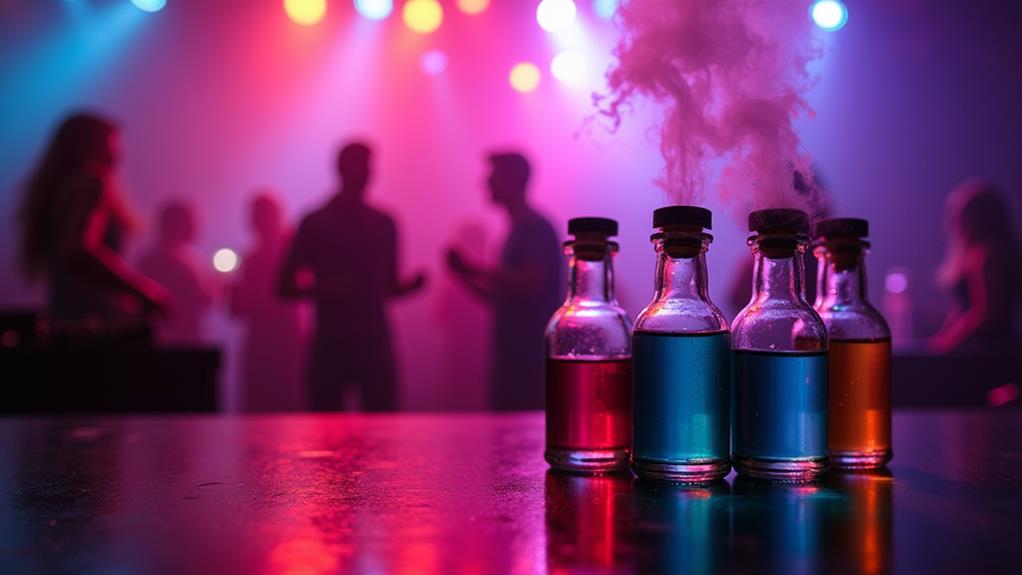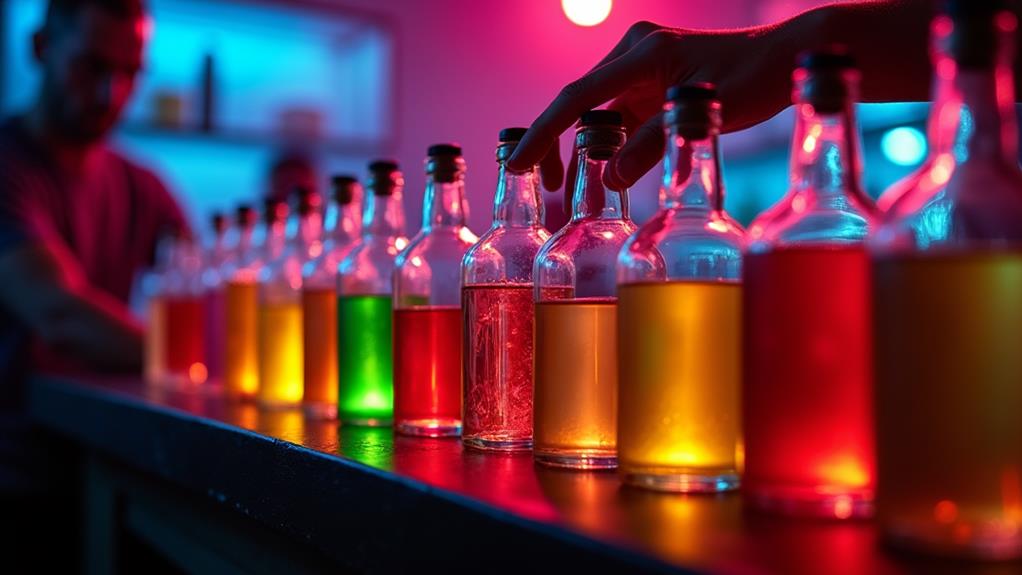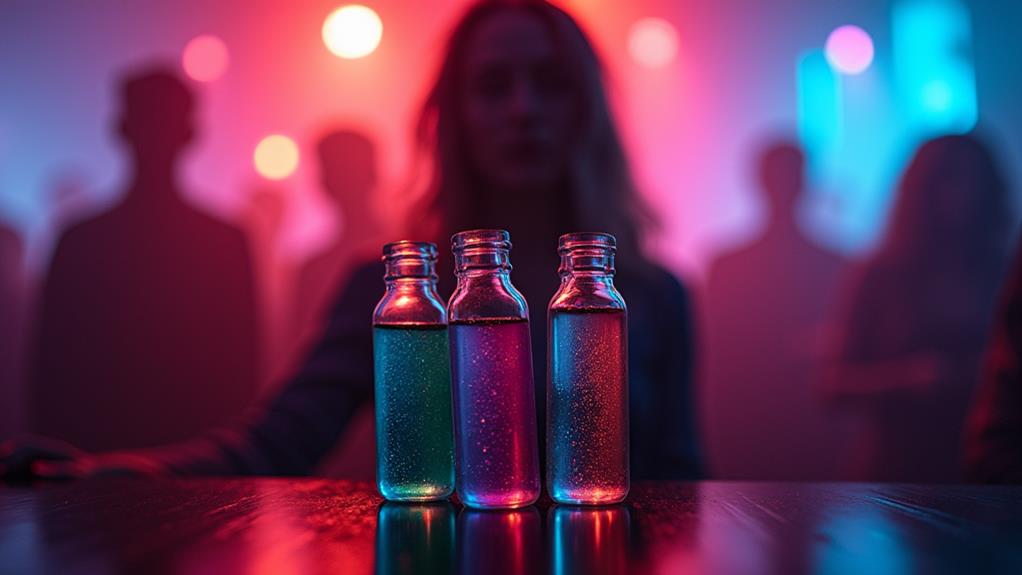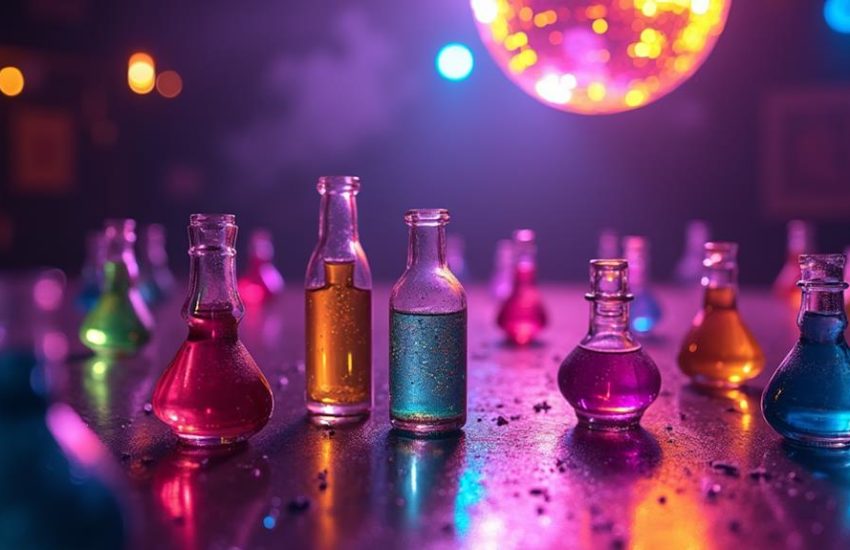Poppers: The Party Drug Thats Secretly Destroying Your Health
Poppers, a class of inhalant drugs known as alkyl nitrites, pose significant health risks in spite of their popularity as recreational substances. Short-term effects include dizziness, headaches, and vision problems, whereas long-term use can lead to organ damage and psychological dependence. Acute risks increase when combined with alcohol or erectile dysfunction medications. Chronic use may result in cardiovascular issues, compromised liver and kidney function, and a weakened immune system. Legal status varies globally, complicating availability and regulation. Although some view poppers as harmless party drugs, mounting evidence suggests they can secretly undermine users' health. Understanding the full scope of potential consequences is vital for informed decision-making.
What Are Poppers?

What Are Poppers?
Poppers are a class of inhalant drugs known as alkyl nitrites, primarily used for recreational purposes. These volatile liquids, often sold in small bottles, produce a brief euphoric effect when inhaled. Common types include amyl nitrite, butyl nitrite, and isobutyl nitrite.
Originally developed for medical use to treat angina, poppers gained popularity in the LGBTQ+ community during the 1970s and 1980s. In spite of their popularity, users often face increased risk-taking in sexual behavior during the influence of poppers.
The effects of poppers on relationships can be complex, as their use may improve sexual experiences for some but can lead to dependency or trust issues. Cultural perceptions of poppers vary widely, from being seen as a harmless party drug to a dangerous substance.
In spite of their widespread availability, poppers can have serious health implications, including decreased blood pressure, headaches, and potential long-term damage to the immune system and vision.
Short-Term Health Risks

In spite of their popularity as a recreational drug, the short-term health risks associated with popper use can be significant and immediate. The acute effects of inhaling poppers include dizziness, headaches, and rapid heart rate. Users may experience nausea, fainting, and disorientation, which can lead to accidents or injuries.
Vision problems, such as temporary blurred vision or seeing "spots," are likewise common. Reports of eye issues, including popper maculopathy, have increased among users, highlighting the potential dangers to vision.
Overdose risks are present, especially when poppers are combined with other substances like alcohol or erectile dysfunction medications. In severe cases, methemoglobinemia can occur, reducing the blood's ability to carry oxygen. This can result in blue-tinged skin, shortness of breath, and potentially life-threatening complications.
Furthermore, poppers can cause chemical burns if accidentally ingested or spilled on the skin. Understanding these risks is vital for those in the party scene seeking informed decisions about their health.
Long-Term Consequences

Beyond the immediate risks, chronic use of poppers can lead to significant long-term health consequences. Regular exposure to these volatile nitrites may result in cumulative damage to various organ systems.
Cardiovascular effects are of particular concern, as prolonged use can contribute to heart arrhythmias, reduced blood oxygen levels, and potential damage to blood vessels. Visual disturbances, such as neon snowflakes, are also common among users.
Furthermore, the addiction potential of poppers should not be underestimated. Although not physically addictive, psychological dependence can develop, leading to increased frequency and quantity of use.
Chronic users may experience persistent vision problems, including decreased visual acuity and changes in color perception. Liver and kidney function may likewise be compromised over time.
In addition, long-term use has been associated with weakened immune system function, potentially increasing susceptibility to infections and other health issues. Understanding these risks is vital for making informed decisions about recreational drug use.
Legal Status and Availability

The legal status of poppers varies considerably across different countries and jurisdictions. In some regions, they are classified as controlled substances, whereas in others, they remain legal for specific uses or are sold as room odorizers.
This inconsistency in regulation has led to a complex environment of availability and legal implications for users and distributors alike. Some countries have started to tighten regulations because of health risks associated with poppers, such as respiratory issues and skin reactions.
Recent market trends indicate a shift towards online sales and discreet packaging to circumvent legal restrictions. Nonetheless, this has additionally raised concerns about quality control and the potential for adulterated products.
Users seeking a sense of belonging within certain social circles may find themselves maneuvering a grey area of legality, often relying on word-of-mouth information about sourcing and safety.
As regulations continue to evolve, staying informed about local laws and potential health risks remains essential for those considering popper use.
Safer Alternatives for Partying

Partygoers seeking alternatives to poppers have several safer options available for enhancing their social experiences.
Exploring natural highs can provide a more sustainable and health-conscious approach to celebration. Engaging in mindful partying practices, such as deep breathing exercises or group meditation, can induce feelings of euphoria and connectedness without chemical assistance.
Physical activities like dancing or group yoga sessions can release endorphins, creating a natural sense of elation. Some individuals find that aromatherapy or consuming certain foods and beverages, such as dark chocolate or kava tea, can elevate mood and energy levels.
Importantly, incorporating supplements rich in essential vitamins like Lutein and Zeaxanthin can support overall well-being during social gatherings.
Furthermore, focusing on creating meaningful connections through conversation and shared experiences can provide a fulfilling alternative to substance use.
Call Us To Assist You
To sum up, the recreational use of alkyl nitrites presents significant health hazards that may be underestimated. During the provision of temporary euphoria, these substances carry both acute and chronic risks to physical wellbeing. The widespread availability and ambiguous legal status of these inhalants contribute to their continued prevalence. Prudent revelers might consider exploring alternative means of enhancing social experiences that do not jeopardize long-term health outcomes. Further research and public education on this topic remain imperative.


